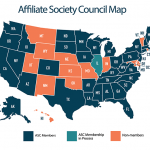“The ACR’s Affiliate Society Council is a two-way communications conduit, to and from the rheumatology practice community, tackling the big issues of the day and the problems we confront daily.” —Alex Limanni, MD, Chair, ACR Affiliate Society Council
Communication is the key to success and this perfectly explains the role of the Affiliate Society Council (ASC). The ASC was started in 2008 to expand on the concept of the Regional Advisory Council (RAC), which was first formed in 2004. The RAC had eight to 10 council members who were asked to monitor various regions of the United States and respond to problems that affected patient care, including insurance carrier policies. Dan Fohrman, MD, served as the first RAC chair and was instrumental in leading the RAC’s evolution to the ASC model, which now represents all state and local societies who apply for membership. The ASC currently has 21 state/local societies. If your society is not a member, please encourage them to join.
As Dr. Limanni states above, the ASC is designed to enhance communication by serving as a “two-way conduit” between the rheumatology practice community and the ACR in order to discuss problems and share solutions. To ensure that they have a good understanding of both the issues facing practitioners as well as the issues and potential solutions ACR can offer, ASC members regularly meet with and provide presentations to the community.
The ASC at Work
One of the first major problems brought to the attention of the RAC—and ultimately acted upon by the ASC—was problematic antinuclear antibody test (ANA) results. John Goldman, MD, who was then serving as the RAC’s Southeast region advisor, was notified by some ACR members of erroneous and misleading ANA results stemming from suboptimal techniques used in these labs. The RAC recommended to the Committee on Rheumatologic Care (CORC) that a task force be formed to investigate this issue. CORC’s ANA Task Force was formed, and a position statement on ANA studies was recently finalized; it is now available online at www.rheumatology.org. The ANA Task Force continues to work on the ANA issue and recently sent a letter to the Food and Drug Administration regarding this issue. The group has also co-signed a letter sent by the College of American Pathologists addressing this topic.
Another problem recently addressed by the ASC was the downcoding of infusion claims in Michigan. The ACR quickly notified the Michigan Rheumatism Society, and both groups contacted the insurer to register a complaint. The insurer responded by explaining that these were errors, the result of mistakes made by claim auditors. It is now retraining its staff to ensure that these mistakes don’t happen again. This successful and rapid outcome was possible due to the ASC working closely with ACR staff and leaders. The ACR is also currently working with state societies in Pennsylvania and Delaware on local issues.

